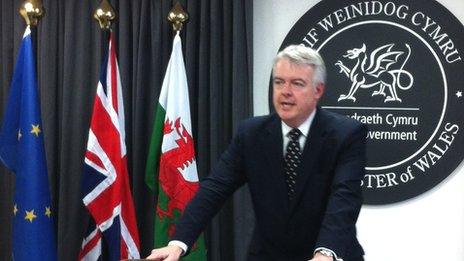Census: Welsh language's crucial challenge, says Carwyn Jones
- Published

Carwyn Jones's children learn through Welsh, but speak English to each other
The next challenge for the Welsh language is making sure young people speak it outside the classroom, First Minister Carwyn Jones has predicted.
He spoke ahead of 2011 Census results being published later on Tuesday, including the number of Welsh speakers.
Mr Jones said his own children speak English to each other, despite going to a Welsh-language school.
"Cracking that is going to be crucial to the future of the language over the next 10 years," he said.
The Office for National Statistics (ONS) will reveal findings from the 2011 Census on a variety of topics, including a question on national identity for the first time, as well as ethnicity, religion, migration and health.
The 2001 Census showed there were 582,000 (20.8%) Welsh speakers, up 2.1% on 1991.
The first minister said he expected the latest Census findings to show a smaller proportion of Welsh speakers in the language's traditional stronghold communities, but more people speaking Welsh in other parts of Wales, including Cardiff.
Legislation to guarantee bilingual services and the establishment of a language commissioner had helped secure the official status of Welsh, he said.
However, it was important that it also remained in use as an everyday language.
Mr Jones said there were places where children talk to each other in English, even though they are taught in Welsh and speak Welsh to their parents.
Although they go to a Welsh-language school, his daughter Seren and son Ruairi speak English to each other. Although he is a Welsh speaker and his wife Lisa has learned the language, Mr Jones said their children learned English first because that was the language at home.
Sustainability in heartlands
"That's not a bad thing. It's happened before in families - but what's important to me is that they use Welsh outside school. Neither of them does," he said.
The Welsh government's , published in March, raises concerns about the sustainability of Welsh in its heartlands.
It points to Census data that show the number of communities where more than 70% of people speak Welsh fell from 92 to 54 between 1991 and 2001.
In 2003 the Welsh government set targets to halt the decline, and to increase the proportion of Welsh speakers 5% by 2011.
Mr Jones said: "My view, looking at the situation with the Welsh language is that a great deal has been done in terms of status, in terms of official use, but that isn't enough.
"The next challenge for us has to be to make sure that young people in particular have an opportunity to use the language outside the classroom, both when they are in school and after they have left school as well."
He added: "This is the challenge that we face now. The number of Welsh speakers among young people is increasing as more and more of them go to Welsh-medium schools, but they tend not to use the language outside of school.
"When you speak to young people as to why this is, they can't give an answer themselves. There are just occasions when English is the appropriate language and there seem to be more and more occasions when that's correct."
- Published16 July 2012
- Published1 March 2012
- Published14 February 2012
- Published27 March 2011
- Published15 January 2011